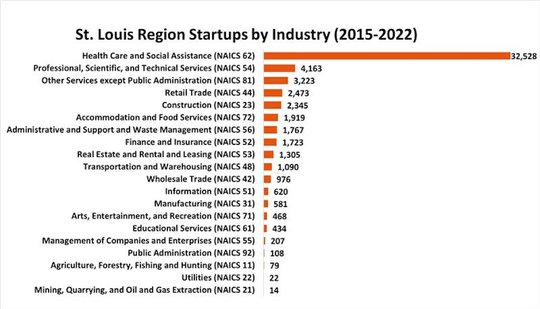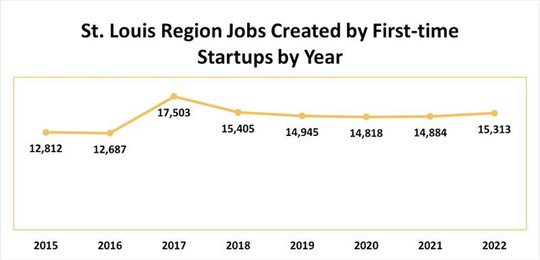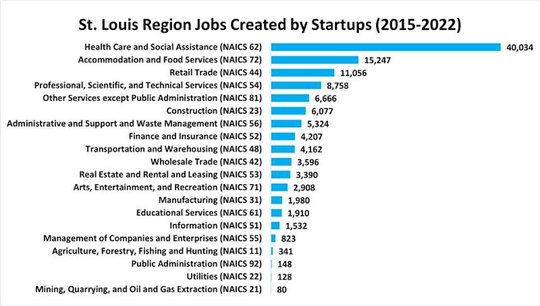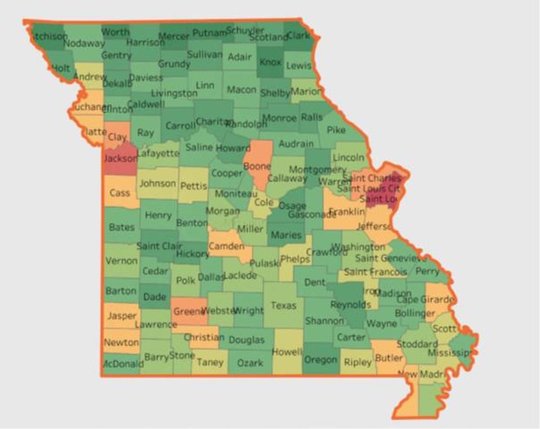
St. Louis is home to 15 Fortune 1000 companies and eight of the Forbes’ largest private companies in America in a vibrant mix of industries across our region. These large companies each started with a first sale and their first employee, in some cases more than 100 years ago. That same spirit continues today and is needed as job creation must be a key driver of economic growth for the St. Louis region.
New and young firms are the primary source of job creation in both urban and rural communities in the U.S., according to the Ewing Marion Kaufman Foundation. Large corporations may grow and add jobs, but they are more skilled at creating efficiencies in their business with the goal of produc¬ing more with fewer resources. Startups are truly the source of new job creation, and both St. Louis and Missouri continue to rely on startups as a large portion of their job growth each year.
2022 was a challenging year for startups. Interest rates increased again, changing the dynamics of borrowing money for both the startups and their customers. Venture capital investments dropped from the previous year. Economic uncertainty has continued, impacting each industry sector very differently.

Startup creation
Startups, however, do not stop just because economic conditions aren’t ideal. This is often the best time to identify a need in the market. The 2023 State of the Workforce Report, produced by the Workforce Solutions Group at St. Louis Community College, identifies a first-year startup as a firm hiring its first employee. Using this definition, 7,782 startups were created in the St. Louis MSA in 2022, up slightly from the 7,320 startups created in 2021. This is an increase of 462 startups from 2021, or 6%.
Job creation by first-time employers
The 7,782 startups were first-time employers for our region and created 15,313 new jobs in 2022. This regional contribution is part of the 18,137 startups with 40,394 new jobs created in Missouri last year. St. Louis anchors Missouri with 44% of the new jobs created across the state in 2022, on pace with the St. Louis area comprising about 40% of the state’s economy.

New job creation by first-year startups has been steady since 2018, with an eight-year average of 14,795 jobs created. From 2015 to 2022, first-year startups in the St. Louis region created a total of 118,367 new jobs.
As positive as job creation is, startups are high risk and failure is part of the equation. According to the U.S. Bureau of Labor Statistics, about 20% of small businesses fail within their first year. In Missouri, 55% of first-time businesses are no longer employing anyone four years later. The companies that survive, however, continue to grow and create more jobs, making up for the jobs lost by other firms closing.

Startups by geography
Across the state, most startups cluster in the state’s population centers including Kansas City, Columbia, Springfield, Joplin, Cape Girardeau and St. Louis, though there are first-time employers located in every county across the state, as depicted in a heat map from MOSourceLink’s Show Me Jobs report.

St. Louis County has the highest density of startups of any county in Missouri, as noted by the deep orange color.
Having startups across a range of industries is as important to our region as having corpora¬tions in a variety of industries. Both startups and larger corporations contribute to a vibrant ecosystem of idea creation and commercialization. Employees often migrate between small and large companies at different points in their careers. Having a strong innovation community is beacon for workers and companies alike.
The data and charts come from the 2023 State of the Workforce Report, produced by the Workforce Solutions Group at St. Louis Community College. To view the full report and any prior annual reports go to stlcc.edu/workforce/st-louis-workforce/st-louis-workforce-reports.aspx.
The Workforce Solutions Group of St. Louis Community College offers corporate training and consulting services and several accelerated training programs, including such areas as advanced manufacturing, health care, biotechnology, culinary arts and technology.



